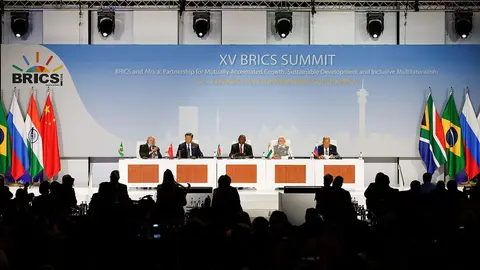Elbowing and shoving for BRICS membership

Forty countries were invited to the last BRICS (Brazil, Russia, India, China and South Africa) summit in Johannesburg. Six of them will formally join the group on 1 January 2024: Saudi Arabia, the United Arab Emirates, Iran, Egypt, Ethiopia and Argentina. However, many others have expressed their desire to form part of this new bloc, among which Indonesia, Mexico and Nigeria stand out due to their demographic, economic and geopolitical weight.
The architects of this agglomeration at the gates of the BRICS are essentially China and India, the former as the obvious antagonist of the great planetary superpower that is the United States; the latter as an explosive emerging power, which in turn aspires to compete with China for supremacy in Asia.
Although both India and Brazil objected to the South African summit becoming an "anti-Western forum", it is clear from all that was discussed, outlined and agreed there that the formation of a bloc opposed to what has so far represented the West in general and the United States in particular is gathering pace.
Despite its very heterogeneous political morphology and evident economic and financial imbalances, the bloc wants to set itself up as the representative of the so-called Global South. The main underlying reason for this race to join the club is the growing distrust of the United States, not so much because it plays the role of the world's gendarme, but because they do not appreciate that its role as arbiter of global ambitions and conflicts is carried out fairly.
They find de-dollarisation in trade transactions very attractive, convinced that the worst thing that could happen to a country that does not have sufficient deterrent tools or weapons and is singled out by Washington's accusing finger would be not to have a strong protector, a "cousin of Zumosol" to act as a buffer. Rightly or wrongly, many aspiring countries consider that the current economic and financial system, the final legacy of Bretton Woods, is susceptible to being turned into a weapon of war at any time through the increasingly frequent application of sanctions. The consequences of these sanctions rarely result in the overthrow of a dictatorial or tyrannical regime, but it is clear that they are a heavy punishment for the population of the countries that suffer them. There are countless examples that support this thesis, from Russia to Cuba or Venezuela, always depending in any case on the specific interests of the sanctioning party to aggravate or attenuate the intensity of the punishment.
China has taken it upon itself to widely disseminate data such as that published by the Center for Economic and Policy Research in Washington (CEPR), according to which the United States has increased the sanctions imposed on foreign individuals, institutions and countries by 933% in twenty years. This translates, according to Chinese analysts such as Alex Lo, into a third of the global economy and a quarter of the countries that sit at the UN having been sanctioned by the US in one way or another. The list compiled by the State Department's Treasury's Office of Foreign Assets Control runs to 2,206 pages with more than 12,000 names of individuals and entities punished by the US administration.
With this argument, Chinese diplomacy, seconded in this case by Russian and Brazilian diplomacy in particular, propagates that Washington prefers the low cost of a system of sanctions and economic blockade to its proverbial "boots on the ground" that it applied in the invasions of Afghanistan and Iraq, from where it had to leave after an enormous financial cost, which in the end proved counterproductive.
The G7 will have a lot of work to do to demonstrate with counter-arguments the goodness of its model of relations. To begin with, on 9 and 10 September in New Delhi they will have to confront each other at the G20 summit, dubbed by India's chief diplomat Subrahmanyam Jaishankar as "the summit of the voice of the Global South".
For the moment, if the G7 accounts for 43.5% of global GDP, that of the BRICS 11 from January 2024 will be 34%, with the latter having an overwhelming superiority in terms of human capital. In view of all this, it also seems very clear that there is no room left in this world for neutrals or independents, even for that Cold War euphemism of the so-called Non-Aligned countries.





